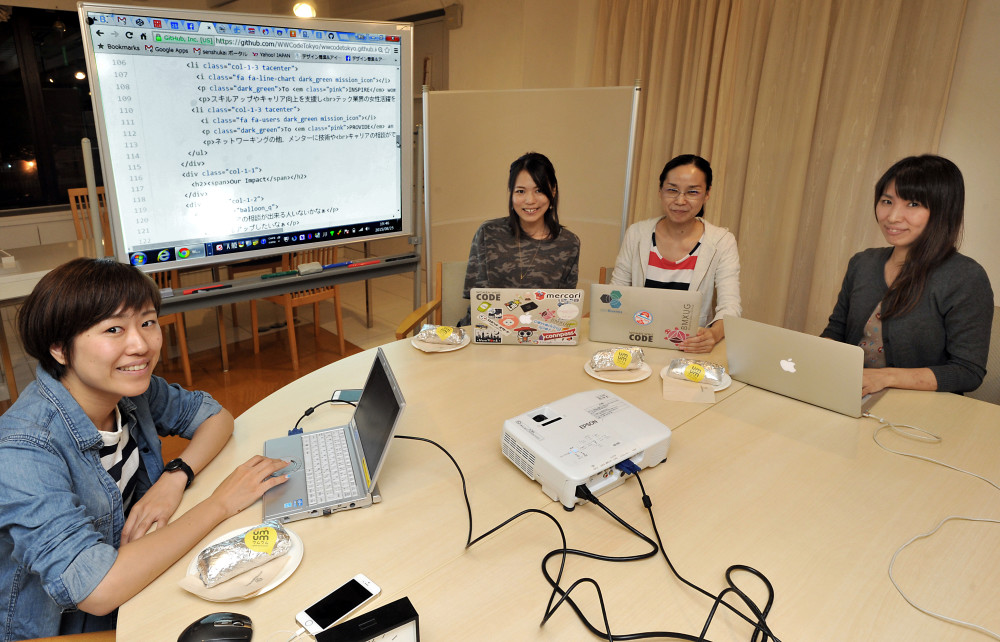By Kazuaki Nagata
Japan Times, Tokyo.
To outsiders, the world of computer programming may seem to be the exclusive domain of male geeks.
Yet with their snacks, laptops and convivial conversation, the members of support group Women Who Code Tokyo are a far cry from the stereotype.
Together they form the Tokyo branch of a worldwide network that aims to put the “sys” in sisterhood — a club for female programmers and those who want to learn.
Established in May 2014, the group organizes weekly meet-ups and now has 300 registered members in Tokyo, all interested in coding and technology.
While women are currently an extreme minority in the workplace in this field, female professionals hope their numbers will increase and bring greater diversity to the world of Japanese programming and engineering.
Himi Sato, cofounder of Women Who Code Tokyo, was once like any other beginner. She was interested in the field but did not know where to start.
She knew there were gatherings to study programming, but thought they wouldn’t be for her.
“I really didn’t know anything and didn’t think there were that many women. So I didn’t want to join those meet-ups just by myself,” Sato said. “And I thought people who come to such meetings already know (about programming), so I didn’t think I could ask very basic questions.”
Sato then learned about Women Who Code, which was founded in the U.S. and has grown into a global network offering women interested in programming and tech careers a chance to learn from each other. Women Who Code now has about 60 branches worldwide.
Sato was intrigued to hear that the group’s gatherings are exclusively for women, so she contacted the head of the nonprofit organization in the U.S. and said she wanted to start something similar in Tokyo.
The U.S. headquarters offered help, and the Tokyo branch was launched.
Women Who Code Tokyo’s weekly meet-ups typically draw around 10 people. The two-hour evening gatherings are casual and usually have no set subject, so attendees can focus on whichever computer language they want to learn, whether it is HTML, Ruby or Python. Sato said participants usually form groups that focus on a certain theme.
The group has also organized “hackathon” events, where women collaborate to write software, for example programming a Pepper unit, the humanoid robot developed by SoftBank Corp.
Sato said women who come to the meet-ups range from beginners to those already working as programmers who are eager to learn about the latest technology.
At one recent meet-up, participants said the group is a useful venue where they can indulge their curiosity.
“I was interested in programming but didn’t know where to start,” said Rika Umeno, 27, who happened to be studying Python during the meet on Aug. 25.
Umeno has attended the group’s meetings several times. She said she is intrigued to see how lines of code turn out when run by the computer.
While Women Who Code Tokyo lowers the hurdle for women to enter the world of coding, female programmers and engineers remain a minority in the workplace.
The 2010 Japan Census found that of 323,580 software creators, only 46,540, or 14.4 percent, were female. There were 405,630 men working as system administrators, against only 54,940 women.
Some female programmers interviewed by The Japan Times voiced hope that more women would choose the profession.
Mai Morohashi, who works as an application engineer at Rakuten Inc., a Tokyo-based Internet giant, said she is the only woman in her team of about 11 people. She studied computer science at university at a time when few female students majored in the field.
buy cozaar generic https://buynoprescriptionrxonline.com/cozaar.html over the counter
“When I think about why there are not many women who study computer science at college, it’s probably because they think it’s geeky,” she said.
Morohashi feels it is essential to improve the image of computer science and promote jobs in a way that makes them more appealing to women.
Nanako Kamemaru, an infrastructure engineer at Rakuten’s travel service development department, said the field’s reputation is picking up.
“I think computer science has acquired a cooler image. For instance, smartphones have spread so widely that they have made computers more familiar,” Kamemaru said, adding that the rise of Apple Inc., widely perceived as an innovative technology firm, has contributed to the industry’s improved image.
Kamemaru said her job involves some physically tough work, such as moving heavy servers around, but she believes there are some aspects that women may excel at.
For instance, she develops databases for Rakuten’s travel services, and feels planning of that sort requires the kind of organizational skills that are typically found in women, rather than men.
Kamemaru and Morohashi both said their jobs are challenging in an engaging way, as programmers and engineers need to keep up with changing trends — and this motivates them to keep their skills sharp.














































































































































































































































































































































































